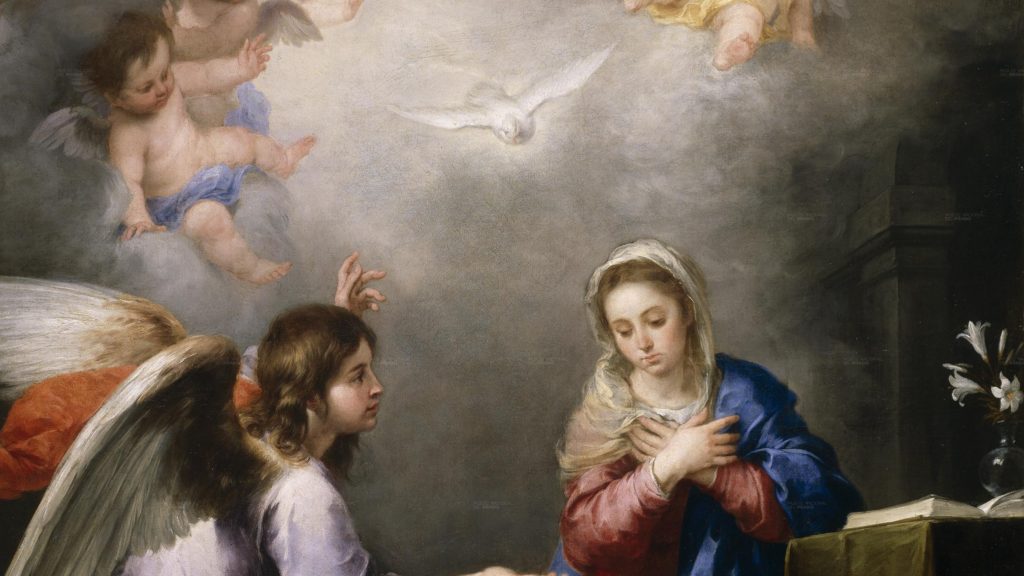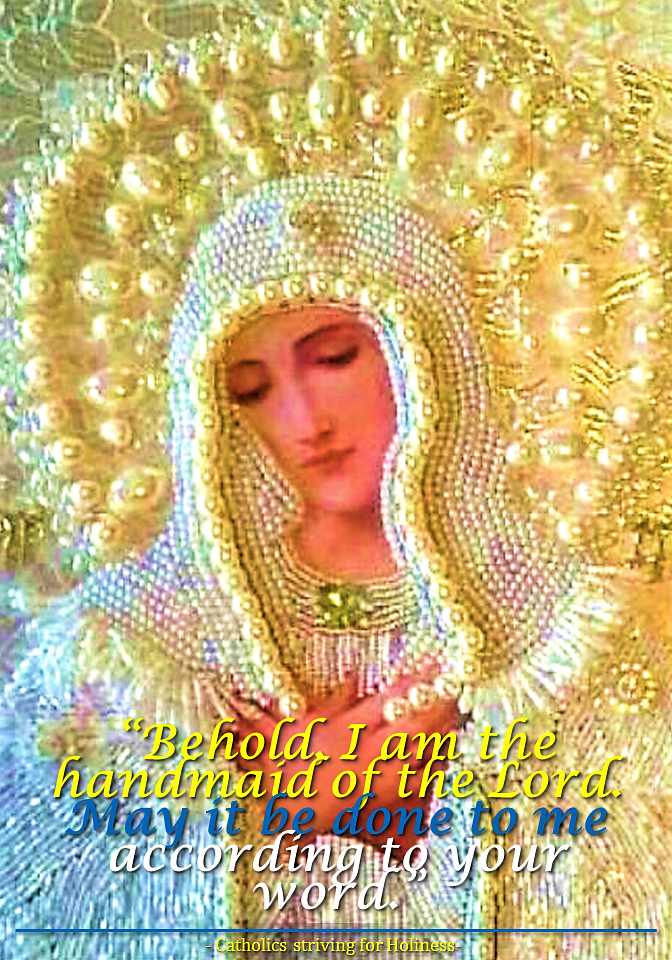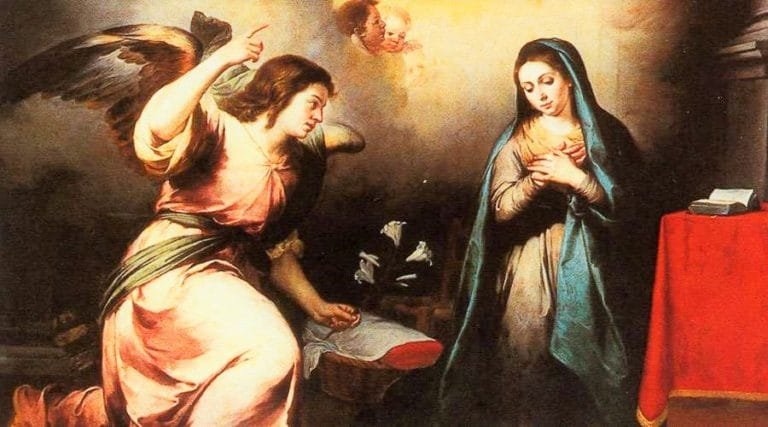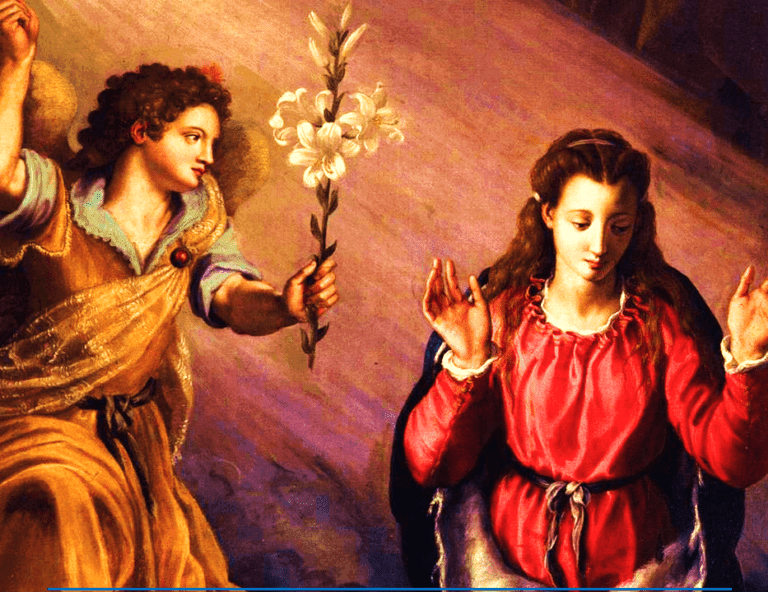4th Sunday of Advent Year B Reflection Homily:
FIAT! BE IT DONE!

OUTLINE
1. Summary of today’s readings.
The mystery of the Incarnation of the Son of God by the work of the Holy Spirit in the womb of Mary, the Virgin (Gospel), is the center of today’s liturgy.
- The Son of God becomes man so that, through his Passion and his cross, we may reach the glory of the resurrection (cf. Collect prayer).
- In Jesus Christ, the promises made by God to David will be fulfilled. His”kingdom will last forever in the presence of the Lord” (1st reading and Gospel).
- At Mass, the Holy Spirit, in a similar way when he came into Mary’s womb with his power, comes down onto the bread and wine and transforms them into the Body and Blood of Our Lord (Prayer over the Offerings)
2. The Annunciation and Incarnation of the Son of God.
As Christmas approaches, our Mother Church brings us our attention in today’s liturgy the fulfillment of the Scriptures through the generous response of the Blessed Virgin Mary, as recounted to us in the Gospel of St. Luke on the Annunciation:
The angel Gabriel was sent from God to a town of Galilee called Nazareth, to a virgin betrothed to a man named Joseph, of the house of David, and the virgin’s name was Mary. And coming to her, he said, “Hail, full of grace! The Lord is with you.” But she was greatly troubled at what was said and pondered what sort of greeting this might be. Then the angel said to her, “Do not be afraid, Mary, for you have found favor with God.
“Behold, you will conceive in your womb and bear a son, and you shall name him Jesus. He will be great and will be called Son of the Most High, and the Lord God will give him the throne of David his father, and he will rule over the house of Jacob forever, and of his kingdom there will be no end.” But Mary said to the angel, “How can this be, since I have no relations with a man?” And the angel said to her in reply, “The Holy Spirit will come upon you, and the power of the Most High will overshadow you. Therefore the child to be born will be called holy, the Son of God. And behold, Elizabeth, your relative, has also conceived a son in her old age, and this is the sixth month for her who was called barren; for nothing will be impossible for God.” Mary said, “Behold, I am the handmaid of the Lord. May it be done to me according to your word.” Then the angel departed from her.
This Gospel passages are of utmost importance for they serve as the biblical bases of several truths of our faith: Immaculate Conception, Divine Maternity of Mary, the Incarnation of Our Lord Jesus Christ, and the Virginal Conception of the Son of God through the power of the Holy Spirit.

As the Navarre Bible Commentary to the Gospel of St. Luke explains:
Here we contemplate our Lady who was “enriched from the first instant of her conception with the splendour of an entirely unique holiness; . . . the virgin of Nazareth is nailed by the heralding angel, by divine command, as ‘full of grace’ (cf. Lk 1:28), and to the heavenly messenger she replies, ‘Behold the handmaid of the Lord, be it done unto me according to thy word’ (Lk 1:38). Thus the daughter of Adam, Mary, consenting to the word of God, became the Mother of Jesus. Committing herself whole-heartedly and impeded by no sin to God’s saving will, she devoted herself totally, as a handmaid of the Lord, to the person and work of her Son, under and with him, serving the mystery of redemption, by the grace of Almighty God. Rightly, therefore, the Fathers see Mary not merely as passively engaged by God, but as freely cooperating in the work of man’s salvation through faith and obedience” (Vatican, II, Lumen gentium, 56).
“HAIL”: literally the Greek text reads “Rejoice!”, obviously referring to a unique joy, over the news which the angel is about to communicate.
“FULL OF GRACE”: by this unusual form of greeting the archangel reveals Mary’s special dignity and honour.
- The Fathers and Doctors of the Church “taught that this singular, solemn and unheard-of greeting showed that all the divine graces reposed in the Mother of God and that she was adorned with all the gifts of the Holy Spirit,” which meant that she “was never subject to the curse”, that is, was preserved from all sin.
- These words of the archangel in this text constitute one of the sources which reveal the dogma of Mary’s Immaculate Conception (cf. Pius IX, Ineffabilis Deus, Paul VI, Creed of the People of God).
“THE LORD IS WITH YOU!”: these words are not simply a greeting (“the Lord be with you”) but an affirmation (“the Lord is with you”), and they are closely connected with the Incarnation. St Augustine comments by putting these words on the archangel’s lips: “He is more with you than he is with me: he is in your heart, he takes shape within you, he fills your soul, he is in your womb” (Sermo de Nativitate Domini, 4).
“BLESSED ARE YOU AMONG WOMEN!”: God will exalt Mary over all women. She is more excellent than Sarah, Hannah, Deborah, Rachel, Judith, etc, for only she has the supreme honour of being chosen to be the Mother of God.
The ANNUNCIATION is the moment when our Lady is given to know the vocation which God planned for her from eternity.
- When the archangel sets her mind at ease by saying “DO NOT BE AFRAID, MARY,” he is helping her to overcome that initial fear which a person normally experiences when God gives him or her a special calling. The fact that Mary felt this fear does not imply the least trace of imperfection in her: hers is a perfectly natural reaction in the face of the supernatural. Imperfection would arise if one did not overcome this fear or rejected the advice of those in a position to help — as St Gabriel helped Mary.
- The archangel Gabriel tells the Blessed Virgin that she is to be the Mother of God, by reminding her of the words of Isaiah which announced that the Messiah would be born of a virgin, a prophecy which will find its fulfilment in Mary (cf. Mt 1:22-23; Is 7-14).
He reveals that the Child will be “GREAT”:
- his greatness comes from his being God, a greatness he does not lose when he takes on the lowliness of human nature. He also reveals that Jesus will be the King of the Davidic dynasty sent by God in keeping with his promise of salvation; that his Kingdom will last forever, for his humanity will remain forever joined to his divinity; that “HE WILL BE CALLED SON OF THE MOST HIGH”, that is, that he really will be the Son of the Most High and will be publicly recognized as such, that is, the Child will be the Son of God.
The archangel’s announcement evokes the ancient prophecies which foretold these prerogatives. Mary, who was well-versed in Sacred Scripture, clearly realized that she was to be the Mother of God.
“THE HOLY SPIRIT WILL COME UPON YOU, AND THE POWER OF THE MOST HIGH WILL OVERSHADOW YOU. THEREFORE THE CHILD TO BE BORN WILL BE CALLED HOLY, THE SON OF GOD.“
- The “shadow” is a symbol of the presence of God. When Israel was journeying through the wilderness, the glory of God filled the Tabernacle and a cloud covered the Ark of the Covenant (Ex 40:34-36). And when God gave Moses the tables of the Law, a cloud covered Mount Sinai (Ex 24:15-16); and also, at the Transfiguration of Jesus the voice of God the Father was heard coming out of a cloud (Lk 9:35).
- At the moment of the Incarnation the power of God envelopes our Lady — an expression of God’s omnipotence. The Spirit of God — which, according to the account in Genesis (1:2), moved over the face of the waters, bringing things to life — now comes down on Mary. And the fruit of her womb will be the work of the Holy Spirit. The Virgin Mary, who herself was conceived without any stain of sin (cf. Pius IX, Ineffabilis Deus) becomes, after the Incarnation, a new tabernacle of God.
“BE IT DONE UNTO ME ACCORDING TO YOUR WORD.”
- Once she learns of God’s plan, our Lady yields to God’s will with prompt obedience, unreservedly. She realizes the disproportion between what she is going to become — the Mother of God — and what she is — a woman. However, this is what God wants to happen and for him nothing is impossible, and therefore no one should stand in his way. So Mary, combining humility and obedience, responds perfectly to God’s call: “Behold, I am the handmaid of the Lord; let it be done to me according to your word”.
“Mary’s ‘yes’ opens the door to the ‘yes’ of Jesus: “I come to do your will’”….Indeed, “in Mary’s ‘yes’ there is the ‘yes’ of all of salvation history and there begins the ultimate ‘yes’ of man and of God: there God re-creates, as at the beginning with a ‘yes’ He made the earth and man, that beautiful creation: with this ‘yes’ I come to do your will and more wonderfully he re-creates the world, he re-creates us all”.
Pope Francis.
3. Gratitude to Our Lady. Our fiat!
Dear brethren in Christ, as we prepare ourselves to commemorate the Birth of Our Lord Jesus Christ, let us also thank Our Lady for her generous response to God’s plan −Fiat! (Be it done!)− thus, making the Incarnation of Our Lord Jesus Christ, the wondrous reality of our salvation possible. With her correspondence, God became man, and we are introduced to a new life, a life of grace, that is why she is also our mother.
Let us also remember that from our generous response, a lot of things depend: yes, even the salvation of many souls.
Mother Mary, our profound filial gratitude. Help us give our “yes” to God. Through your loving maternal intercession, may we put Jesus at the center, not only of Christmas,, but also of our entire existence, as you have carried out with your Fiat! Be it done unto me according to your word.
4. VIDEO COMMENTARY: DO YOU BELIEVE THAT NOTHING IS IMPOSSIBLE WITH GOD?
Today’s liturgical readings revolve around the fulfillment of God’s promises that He made long time ago. In the first reading (2 Samuel 7:1-5, 8b-11), King David was determined to build a magnificent house for the Ark of the Covenant which was just housed in a tent since the Israelites left Egypt. The Lord, instead, built the house of David – a long line of descendants ending with Jesus. The second reading (Romans 16:25-27), exhorts Christians to have greater faith as, finally, the Savior, will come.
In today’s gospel reading (Luke 1:26-38), all the unexpected and unlikely things happened to usher in the Savior of the world. For one, the invitation of the angel Gabriel to Mary to become the Mother of God happens in an obscure place, Nazareth – far from Athens or Rome. For another, Gabriel announces that an aged woman, Elizabeth, Mary’s cousin, will bear a child.


